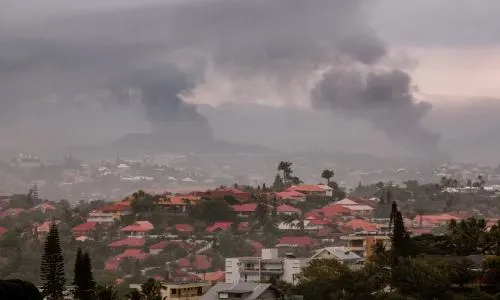The French president, Emmanuel Macron, has called a meeting of his defence and security council to discuss the deadly unrest in the Pacific territory of New Caledonia.
It is the third such meeting in less than a week, the previous two having resulted in the decision to declare a state of emergency in the French territory and then to send reinforcements to help government forces on the ground restore order.
On Sunday, French forces smashed through dozens of barricades in a bid to retake the main road to La Tontouta international airport, which has been closed to commercial traffic since last Tuesday.
Authorities have said the airport will not reopen until midnight on Thursday French time, ignoring a request from Australia and New Zealand for it to be opened so they can evacuate their citizens.
“Republican order will be re-established whatever the cost,” the French high commissioner for New Caledonia, Louis Le Franc, told reporters in the capital Nouméa. If separatists “want to use their arms, they will be risking the worst”, he added.
The warning came as the bodies of two gendarmes who died in New Caledonia, Nicolas Molinari and Xavier Salou, were returned to France on Monday morning.
France’s interior minister, Gérald Darmanin, was at the military base at Vélizy-Villacoublay in the south-west suburbs of Paris to decorate the men posthumously and receive the coffins. Both gendarmes were based in the Paris region.
At least three other people, Indigenous Kanaks, have also been killed in the violence.
According to French media reports on Monday, the number of roadblocks set up and controlled by independence activists is spreading despite the efforts of police and gendarmes.
The night was described as “agitated” in terms of clashes between police and rioters, and the New Caledonian chamber of commerce said 150 island businesses had been pillaged and torched, leaving 1,000 people without work.
New Caledonia, with a population of about 270,000, has been convulsed by unrest for a week. It was sparked by French plans to impose new rules that would give tens of thousands of non-Indigenous residents voting rights.
The French territory off north-east Australia has long been riven by pro-independence tensions, but this is the worst violence in decades.
Authorities say about 230 people have been detained while an estimated 3,200 people are either stuck in New Caledonia or unable to return to the archipelago.
France says about 1,000 additional security force members have been sent to the islands.
About 600 heavily armed police and paramilitaries took part in an operation on Sunday to retake the 40-mile (64km) main road from Nouméa to the airport, authorities said.
Forces with armoured vehicles and construction equipment destroyed 76 roadblocks, Darmanin said on X.
“The police came through, they cleared the road, and we stood aside. We’re pacifists,” said Jean-Charles, a man in his 50s wearing a scarf around his head and carrying a Kanak independence flag, a few miles outside the airport. “Once they were gone, we put the roadblock back up,” he added.
The highway is needed to restore supply chains as the archipelago faces shortages of items from groceries to blood for transfusions. “We are starting to run short of food,” Le Franc said.
In Wellington, New Zealand’s foreign minister, Winston Peters, said the the country’s military had “completed preparations” for repatriation flights.
Australian tourists Maxwell Winchester and his wife, Tiffany, were barricaded in a resort on the airport road for days after they were supposed to leave Nouméa.
“Every night we had to sleep with one eye open … worried that they were coming in to loot us,” he said. “This morning at an exit near here, the gendarmerie was coming through and there was a shootout.”
New Caledonia has been a French territory since the mid-1800s. Almost two centuries on, its politics remain dominated by debate about whether the islands should be part of France, autonomous or independent – with opinions split roughly along ethnic lines.
Indigenous Kanaks make up about 40% of the population but tend to be poorer and have fewer years of schooling than European Caledonians. Kanak groups say the latest voting regulations would dilute the Indigenous vote.
On Sunday, the presidents of four other French overseas territories – La Réunion in the Indian Ocean, Guadeloupe and Martinique in the Caribbean and French Guiana in South America – called for the withdrawal of the voting changes in an open letter.
Civil liberties groups have challenged the TikTok ban that is in place, with an emergency hearing scheduled at France’s top administrative court in Paris for Tuesday.














